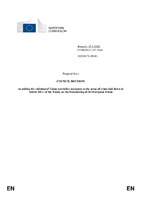| dc.description.abstract | Restrictive measures are an essential tool for the promotion of the objective of the Common
Foreign and Security Policy (‘CFSP’), as set out in Article 21 of the Treaty on European
Union (‘TEU’). These objectives include safeguarding the Union’s values, maintaining
international peace and security as well as consolidating and supporting democracy, the rule
of law and human rights.
For the sake of preserving these values, the Union may impose restrictive measures against
third countries, entities or individuals. These measures include targeted individual measures,
i.e., targeted financial sanctions (asset freezes) and restrictions on admissions (travel bans), as
well as sectoral measures, i.e. arms embargoes or economic and financial measures (e.g.
import and export restrictions, restrictions on the provision of certain services, such as
banking services)
1
. Preserving international peace and security, is of particular pertinence in
the current context of Russia’s invasion of Ukraine. The Union has put in place a series of
restrictive measures against Russian and Belarusian individuals and companies, some of
which date back to 2014. In this context, in order to enhance Union-level coordination in the
enforcement of these restrictive measures, the Commission set up a ‘Freeze and Seize’ Task
Force2
. Besides ensuring coordination among Member States and Union Agencies such as
Europol and Eurojust, it seeks to explore the interplay between restrictive measures and
criminal law measures.
Currently, the Union has over forty regimes of restrictive measures in place. Some of these
implement restrictive measures by the United Nations; others are adopted autonomously by
the Union. In addition to regimes addressing country-specific situations, the Union has also
adopted horizontal regimes targeting proliferation and use of chemical weapons, cyberattacks,
human rights violations and terrorism3
. Restrictive measures are binding on Union Member
States and on any person or entity under the jurisdiction of the Member States (EU
operators) |

